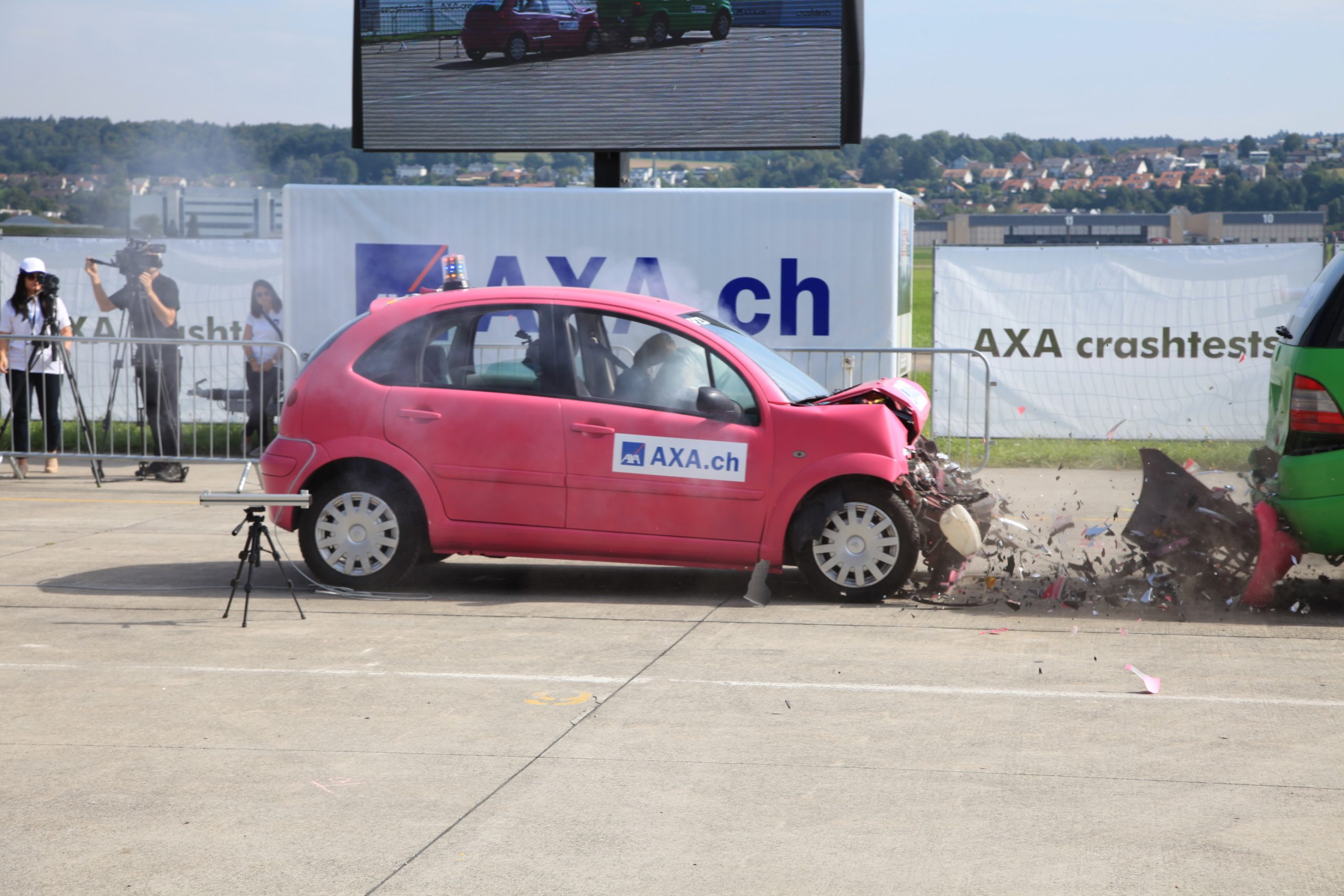Autonomous cars pose new risks
Accident researchers are convinced that self-driving cars will increase road safety. At this year's crash test in Dübendorf, accident insurer AXA showed which new risks arise and which accidents cannot be avoided even with the best technology.

From a safety perspective, AXA Winterthur's accident researchers support technological progress towards fully automated driving. It can already be demonstrated today that some Driver assistance systems significantly increase safety. Studies by the accident insurer, for example, show that passenger cars with emergency brake assistance systems cause between 30 and 69 percent fewer rear-end collisions, depending on the vehicle model studied. And ESP (Electronic Stability Program), which selectively brakes individual wheels to prevent skidding, leads to more than 40 percent fewer self and skidding accidents, according to the data. Since AXA is convinced of the potential of such systems, in the future it intends to take a vehicle's safety equipment into account even more than before when setting rates.
Automated cars increase safety
"More than 90 percent of all accidents today are still caused by humans. With improved technology, more sophisticated sensors and further developed systems, I am convinced that the automated vehicle will significantly increase safety," explains Bettina Zahnd, Head of Accident Research & Prevention at AXA.
Numerous questions regarding the introduction of automated vehicles are currently still unanswered, including how great the acceptance of drivers will be. According to the survey, confidence in the technology is still rather restrained: Around half of the Swiss and Germans surveyed said they did not trust a computer to steer reliably and behave properly in traffic. In addition, over 60 percent of the men and women surveyed in Germany and Switzerland said that they enjoy driving and would not want to do without it.
What does the survey say?
Despite certain reservations, one in three respondents in Switzerland and one in four in Germany believe that autonomous cars will be safer to drive than humans in the future. It is striking that women and men in Switzerland assess this very differently: 47 percent of Swiss men believe that autonomous cars will be safer than humans in the future, while only 22 percent of women think so. Overall, men and younger people are more open to autonomous driving than women and older people. Of those aged 18 to 34 in Switzerland, almost half say they would like to use the time spent driving for other activities such as working, reading, sleeping or other things; of those over 35, around one in three say this.
The survey also shows that respondents' expectations of the safety of automated vehicles are extremely high: around 40 percent of all respondents in Germany and Switzerland believe that autonomous vehicles should not only cause fewer accidents than conventional ones, but that they should not cause any accidents at all in order to be considered safe.
New and existing risks in the crash test
It is clear that accidents will continue to occur in the future. "Software-based solutions create new risks that cannot yet be quantified today, such as technical defects or even hacker attacks, the risk of which will increase as a result of networked vehicles," says accident research expert Zahnd. What can happen was demonstrated in a crash in which the vehicle brake is manipulated: A "hacked" car accelerates at full engine power instead of braking.
For the accident insurer, it is clear that the insurance company will continue to pay for all damages to third parties in the future, regardless of whether the vehicle is automated or conventional. "Subsequently, we will examine who is responsible for the accident and whether, for example, a technical failure led to the accident. But our policyholders and the injured parties don't have to worry about such questions - as insurers, we take care of that, and benefits in the event of a claim are provided in any case," says Zahnd.
Since hardly any cars have yet been driven in fully automated traffic, no experience is yet available on the probability of accidents or possible causes. In accident reconstruction as well as in research into the causes of accidents, the analysis of skid marks and damage to the vehicle has been decisive up to now. However, as vehicles become increasingly connected, the data that the vehicle records is becoming more and more important in accurately reconstructing how the accident occurred. "Without access to accident-relevant vehicle data, it will no longer be possible to clearly clarify an accident in the future," Bettina Zahnd emphasizes.
Vehicle data is essential for accident reconstruction
Even today, newer vehicles record numerous data and automatically transmit them to the vehicle manufacturer. However, drivers are often unaware of what this data is. So far, the question of who has sovereignty over the data has not been clarified. AXA is therefore calling for transparency and decision-making rights for vehicle owners. "The vehicle owner must be able to determine for himself what data is transmitted, who can access his vehicle data and for what purpose it is used. In the event of an accident, it must also be clarified in what form the data can be used for accident analysis," explains Zahnd.
According to the survey, around 80 percent of all respondents believe that the data recorded by the car belongs to the vehicle owner or the respective driver. Only 6 percent believe that this data belongs to the car manufacturer. There is also relatively low agreement among respondents that data such as constant GPS position or destination of the navigation device is automatically transmitted to the vehicle manufacturer. Consent for automatic data transfer is higher when it comes to technical information such as oil pressure, fuel consumption or tire pressure. In general, younger people are more willing to share data with the manufacturer or other agencies than older people. Willingness to share data is highest when it comes to remote diagnosis of the vehicle or accident research purposes.
Source: AXA Winterthur









